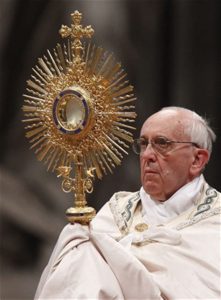Neither height nor depth, nor anything else in all creation, will be able to separate us from the love of God that is in Christ Jesus our Lord.
Romans 8:39
 It is important that priests, deacons or extraordinary ministers of the Eucharist feel comfortable when offering communion to a person with dementia. The progress of dementia has been described as ‘a journey from the mind to the heart’ and that means that people with dementia are often more sensitive to other people’s anxiety than people who do not have dementia. One way to increase your understanding is to become a Dementia Friend. Visit www.dementiafriends.org.uk or call 0300 222 1122 to learn more about what it is like to live with dementia and turn that understanding into action.
It is important that priests, deacons or extraordinary ministers of the Eucharist feel comfortable when offering communion to a person with dementia. The progress of dementia has been described as ‘a journey from the mind to the heart’ and that means that people with dementia are often more sensitive to other people’s anxiety than people who do not have dementia. One way to increase your understanding is to become a Dementia Friend. Visit www.dementiafriends.org.uk or call 0300 222 1122 to learn more about what it is like to live with dementia and turn that understanding into action.
Holy Communion is a great blessing. What makes Communion the supreme gift is not the ‘understanding’ we accord it, but the fact that it is the Body, Blood, Soul and Divinity of Christ. That reality is not in the slightest dependent on anyone’s understanding of so great a mystery. Ministers should not be scared to get it wrong. It is our responsibility to take care of the Eucharist but that does not mean we should not use it. The Lord will not mind if we get it wrong. It is our intentions that count.
What is quite clear is that despite seeming to ‘withdraw’ into ‘another place in their minds’, many people living with dementia are still able to pray and their spiritual lives are still present. Hence we must presume nothing about what the person can and cannot ‘appreciate’ spiritually. For some people in the early stages of dementia, the normal service of Communion may be applicable because they will be familiar with it, but for those further on into the illness, a simplified version which demands no verbal response may be necessary.
Here are DementiaFriendlyEucharist Guidelines for offering communion to a person living with dementia.
The material in the Guidelines is taken from the Diocese of Nottingham’s “Still the Same People” www.spanned.org.uk and Growing Old Grace-fully’s ‘Welcoming Older People: ideas for and from parishes’
